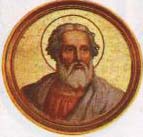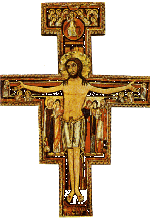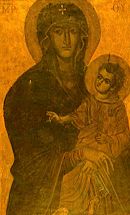Difference between revisions of "Pope Soter" - New World Encyclopedia
m (→Biography) |
m (→Biography) |
||
| Line 33: | Line 33: | ||
Dionysius further states that he intends to have Soter's letter to the Corinthian read publicly in church, as was done previous with the letter of [[Clement of Rome|Clement]], thus affording the espistle semi-scriptural status. Unfortunately, Soter's letter no longer exists. | Dionysius further states that he intends to have Soter's letter to the Corinthian read publicly in church, as was done previous with the letter of [[Clement of Rome|Clement]], thus affording the espistle semi-scriptural status. Unfortunately, Soter's letter no longer exists. | ||
| − | + | In may have been Soter's time that Rome instituted a special feast in celebration of Easter, which it had not done previously. | |
| − | |||
| − | |||
Revision as of 05:32, 31 December 2008
| Saint Soter | |
|---|---|

| |
| Birth name | ??? |
| Papacy began | 166 |
| Papacy ended | 174 |
| Predecessor | Anicetus |
| Successor | Eleuterus |
| Born | ??? Fondi, Campania, Italy |
| Died | 174 (?) Rome, Italy |
Pope Saint Soter was a second-century bishop of Rome, born in Fondi, Campania, Italy. The successor of Anicetus, he hold the office about eight years and was succeeded by Eleutherus, his deacon.
Soter's dates, like all of the popes during this period, are uncertain due to conflicting sources. His reign began 162-168 and ended in 170-177.
that he declared that marriage was valid only as a sacrament blessed by a priest, and that he inaugurated Easter as an annual festival in Rome.
Dionysius, Bishop of Corinth wrote him a letter, of which an extract is preserved, praising his charity and referring to a letter from him.[1]
Soter's feast day was traditionally celebrated on April 22, the same as Pope Caius (283-296). They were celebrated jointly in the Tridentine Calendar and in the successive versions of the General Roman Calendar until 1969, after which they are omitted.
Like nearly all of the early popes, Soter was traditionally believed to have suffered martyrdom. However, the Roman Martyrology does not give him this title.
The name Soter derives from the Greek word "σωτήρ" (sōtēr), meaning a saviour, a deliverer.
Biography
The Liber Pontificalis relates that Soter hailed from the city of Fundi and that his father's name was Concordius. A letter from Bishop Dionysius of Corinth, preserved by Eusebius, praises his charity, saying:
"From the beginning it has been your custom to do good to all the brethren in many ways, and to send alms to many churches in every city, refreshing the poverty of those who sent requests, or giving aid to the brethren in the mines, by the alms which you have had the habit of giving from old, Romans keeping up the traditional custom of the Romans; which your blessed Bishop Soter has not only preserved, but has even increased, by providing the abundance which he has sent to the saints, and by further consoling with blessed words with brethren who came to him, as a loving father his children." (Eusebius, Church History IV.24)
Dionysius further states that he intends to have Soter's letter to the Corinthian read publicly in church, as was done previous with the letter of Clement, thus affording the espistle semi-scriptural status. Unfortunately, Soter's letter no longer exists.
In may have been Soter's time that Rome instituted a special feast in celebration of Easter, which it had not done previously.
Both are mentioned under 22 April in the Roman Martyrology, the official list of recognized saints. The entry about Saint Soter is as follows: "At Rome, Saint Soter, Pope, whom Dionysius of Corinth praises for his outstanding charity towards needy exiled Christians who came to him, and towards those who had been condemned to the mines."[2]
| Roman Catholic Popes | ||
|---|---|---|
| Preceded by: Anicetus |
Bishop of Rome Pope 167–175 |
Succeeded by: Eleuterus |
Notes
- ↑ Catholic Encyclopedia: Caius and Soter, Saints and Popes
- ↑ Martyrologium Romanum (Libreria Editrice Vaticana 2001 ISBN 8820972107)
ReferencesISBN links support NWE through referral fees
External links
| ||||||||||||||||
| |||||||||||||||||||||||||||||||||||||||||||||
| |||||||||||||||||||||||||||||||||||||||||
Credits
New World Encyclopedia writers and editors rewrote and completed the Wikipedia article in accordance with New World Encyclopedia standards. This article abides by terms of the Creative Commons CC-by-sa 3.0 License (CC-by-sa), which may be used and disseminated with proper attribution. Credit is due under the terms of this license that can reference both the New World Encyclopedia contributors and the selfless volunteer contributors of the Wikimedia Foundation. To cite this article click here for a list of acceptable citing formats.The history of earlier contributions by wikipedians is accessible to researchers here:
The history of this article since it was imported to New World Encyclopedia:
Note: Some restrictions may apply to use of individual images which are separately licensed.

